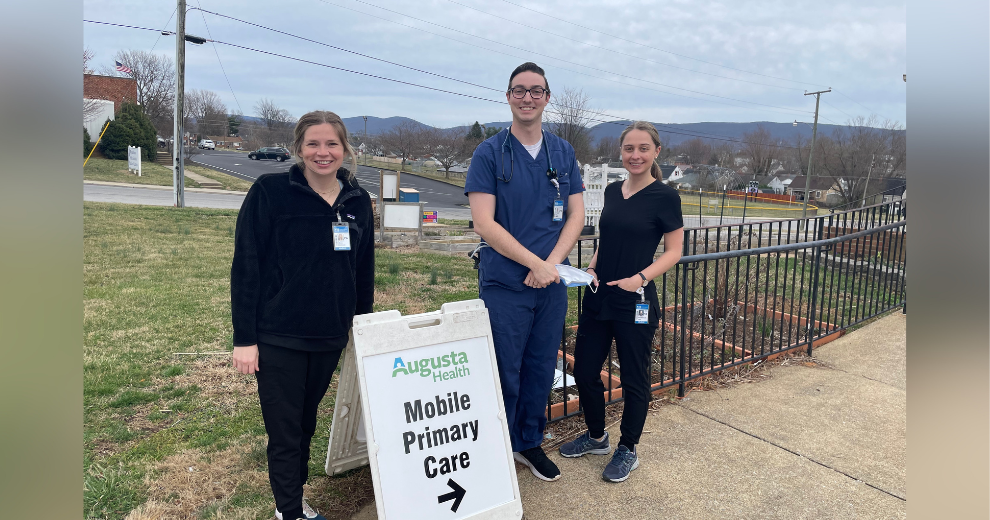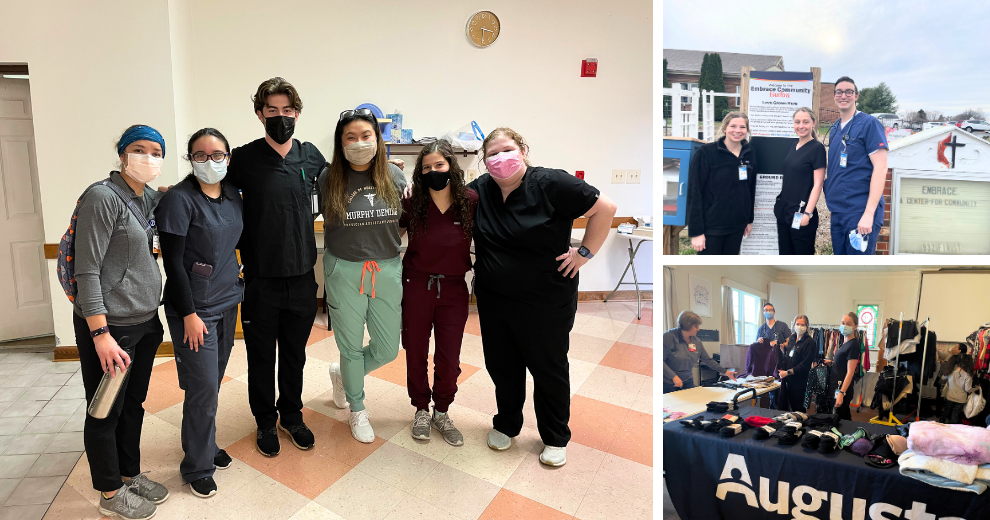Mary Baldwin University’s master of science in physician assistant program (MSPA) has partnered with Augusta Health to help bring quality healthcare to vulnerable and underserved populations in Staunton, Augusta County, and Waynesboro.
Students and professors now work alongside physicians and nurses from the nonprofit healthcare provider in a new mobile clinic that offers a robust slate of free and low-cost medical services like chronic disease management, cancer screening, lab work, vaccinations, and primary care. The unit travels to different areas in the community, setting up two evenings a week in large, easy-to-access spaces like fire departments, community centers, or churches. It provides free transportation, stays open for four hours, and typically treats 20–25 patients a night.
“This is an incredible opportunity for students to gain real-world clinical experience working with professionals to meet the needs of some of our most vulnerable community members,” said physician assistant and MBU professor, Jennifer Hunt, who helped spearhead the expanded partnership, and oversees students at the clinic. Experiences build on a required policy, ethics, and populations course by showing students “the degree and severity of healthcare needs that aren’t currently being met, and the extent of the effort it takes to expand access to care.”

Hunt says the mobile health clinic is the latest outgrowth of a 7-plus-year partnership between MBU’s College of Health Sciences and Augusta Health’s Community Outreach program.
The clinic was inspired by the success of an effort to help vulnerable community members access vaccines during the pandemic — where MBU student and faculty volunteers helped the program distribute thousands of vaccines at nearly 400 community vaccination events. Patients were primarily adults with mobility or transportation barriers, people experiencing homelessness and/or poverty, community members from remote rural areas, undocumented immigrants, and those who were either uninsured or underinsured.
It became obvious there were some pretty major disparities around healthcare access in the community, said Augusta Health mobile primary care unit director, Isaac Izillo. “The people who needed the most help were having the most difficulty getting it.”
Izillo imagined an expanded version of the vaccination outreach program that would bring affordable healthcare services directly to patients. It would provide everything from wellness checkups, to diabetes counseling, free prescriptions, consultations with social workers, and access to healthy foods. And no one who visited the clinic would be refused care.
For instance, even “if they’re not citizens, we don’t turn them away,” Izzillo told the News Leader in April. “We see people who are just people. They live in our communities, so we should be able to help them, make them as well as we can, and seek to promote the best life that they can have through basic primary care. That’s the root of it.”

Students in Mary Baldwin’s physician assistant program gaining valuable professional experience volunteering at mobile vaccination sites and with Augusta Health’s mobile health clinic.
Izillo reached out to MBU’s physician assistant program in the fall of 2022 to gauge interest around helping with the mobile health unit. Program director Dr. Kent Diduch agreed with Hunt: The partnership was a great fit — and aligns perfectly with the PA program’s core values.
About four faculty members began working with the unit shortly thereafter. They started bringing small groups of three to four students along in March.
“Our program has a strong commitment to service, especially for underserved or disadvantaged community members,” said Hunt. “We hold that the primary goal of medical training is service to humanity, and agree with the American Association of Physician Assistants view that, ‘promoting equity and justice in healthcare exemplifies the values of the PA profession, and is the responsibility of each and every PA.’”
But the partnership also benefits students, helping them test classroom knowledge and new skills in the field before they enter official clinical experiences with partnering healthcare providers.
Our imperative is to produce “exemplary healthcare professionals who are extremely well-prepared and capable of providing the highest level of care possible for their patients,” said Hunt. Partnering organizations say “we’re following through on that promise, and this partnership is only going to help with that. It truly is a win-win situation.”